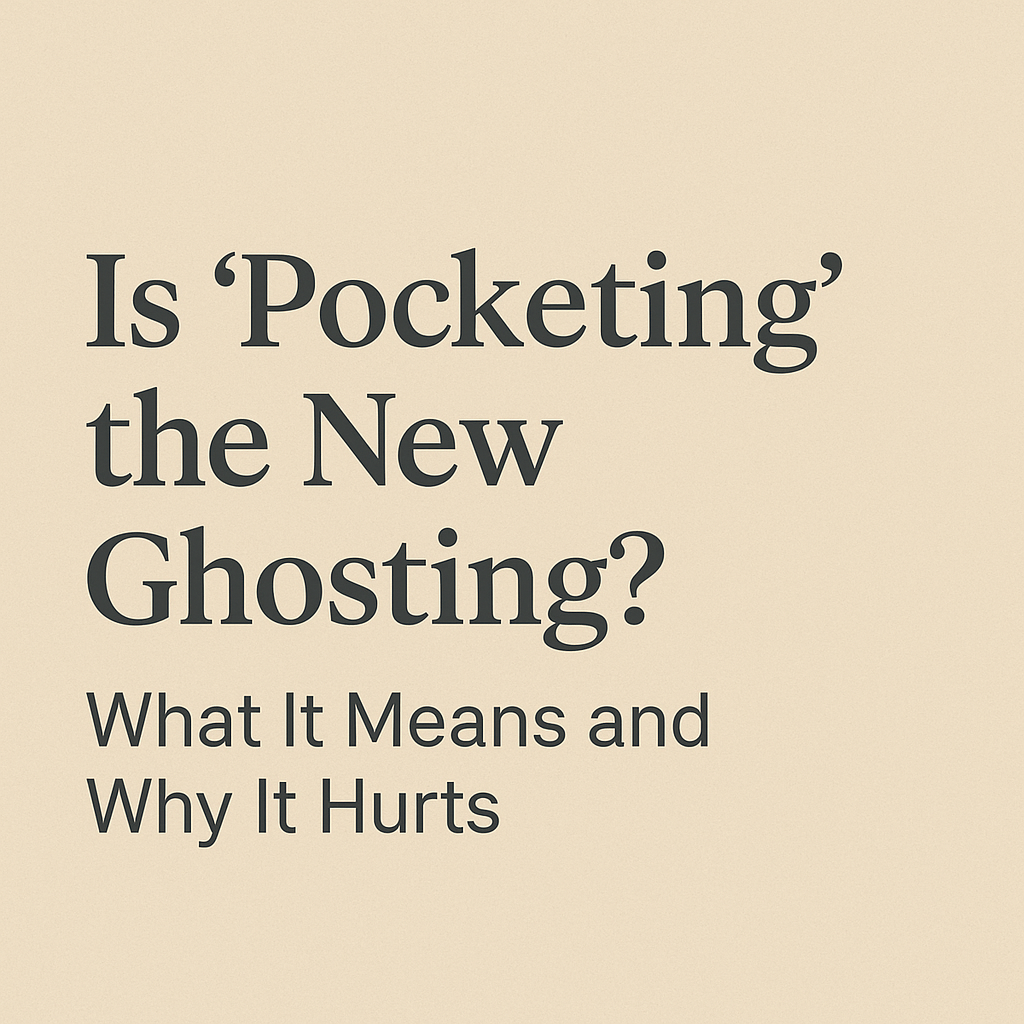
In the age of ghosting, breadcrumbing, and orbiting, there’s a new dating behavior causing confusion and heartache: pocketing. At first glance, everything in your relationship seems fine—frequent dates, late-night talks, even romantic gestures. But something feels off. You’re never introduced to their friends, you’re mysteriously absent from their social media, and any mention of “meeting the family” is deflected with vague excuses. Welcome to the emotionally frustrating world of pocketing.
In this article, we’ll explore what pocketing is, how it compares to ghosting, the psychology behind it, and most importantly, how to recognize and respond to it in your own dating life.
1. What Is Pocketing in Dating?
Pocketing is when someone keeps their partner hidden from the important parts of their life—like friends, family, and social media. The relationship may appear healthy on the surface, but behind the scenes, there’s a clear refusal to acknowledge it publicly.
Signs You’re Being Pocketed:
- They avoid introducing you to friends or family.
- Your relationship is absent from their social media.
- They dodge conversations about the future.
- You only hang out in private or isolated places.
- You feel like a “secret” rather than a partner.
Unlike ghosting, which involves disappearing completely, pocketing keeps the relationship alive—but out of sight.
2. Pocketing vs. Ghosting: How They Compare
Both behaviors stem from a fear of emotional accountability, but they manifest differently:
| Pocketing | Ghosting |
|---|---|
| Relationship continues in secret | Relationship ends without explanation |
| Causes feelings of invisibility | Causes feelings of abandonment |
| Involves deception by omission | Involves total withdrawal |
| Often more drawn out and confusing | Sudden and clear (though painful) |
Emotional Toll:
Pocketing can be even more damaging than ghosting because it erodes self-esteem over time. You’re left questioning your worth and why you’re not “good enough” to be acknowledged publicly.
3. Why Do People Pocket Their Partners?
There are many reasons someone may pocket their partner, including:
- Fear of Commitment: They like you but aren’t ready to go public.
- Family or Cultural Pressure: They may fear judgment from relatives.
- Embarrassment or Insecurity: They’re unsure how others will perceive the relationship.
- Dating Multiple People: They want to keep their options open.
- Avoidant Attachment Style: Difficulty forming close emotional bonds.
According to relationship psychologists, pocketing often reflects more about the person doing it than the one being hidden. It’s a self-protective behavior rooted in avoidance.
4. Why Pocketing Hurts So Much
Being hidden in a relationship sends a subtle but powerful message: “You’re not important enough.” Over time, this erodes confidence, self-worth, and trust.
Psychological Impact of Pocketing:
- Feeling excluded and rejected
- Second-guessing your value
- Confusion and self-blame
- Anxiety about the relationship’s future
Dr. Lisa Firestone, a clinical psychologist, notes that being excluded can trigger emotional wounds tied to abandonment and shame, particularly for those with a history of insecure relationships.
5. Signs You’re Being Pocketed
Here’s how to spot pocketing before it chips away at your emotional health:
- They avoid defining the relationship.
- You’ve never met anyone in their inner circle.
- They say, “I’m just private” to avoid public posts.
- You never attend events or parties together.
- They downplay your relationship to others.
While everyone has a right to privacy, there’s a difference between privacy and secrecy. Pocketing falls into the latter.
6. What to Do If You’re Being Pocketed
If you suspect you’re being pocketed, the first step is to communicate clearly. Ask open-ended questions like:
- “I’ve noticed I haven’t met anyone close to you. Can we talk about that?”
- “How do you see this relationship developing?”
- “Is there a reason we haven’t gone public?”
Tips for Navigating the Conversation:
- Stay calm and avoid blaming language.
- Be honest about your needs and boundaries.
- Watch their response—defensiveness is a red flag.
If they dismiss your concerns or continue the behavior, it may be time to reconsider the relationship. You deserve to be with someone who’s proud to be with you.
7. Can a Relationship Survive Pocketing?
Yes—but only if both partners are willing to address it. Some instances of pocketing stem from situational factors like family issues or social anxiety, and with open communication, couples can work through it.
To Rebuild Trust:
- Set mutual expectations about public acknowledgment.
- Attend events or outings together.
- Discuss long-term goals to ensure alignment.
However, if pocketing persists despite conversations, it often signals a deeper incompatibility or emotional unavailability.
Conclusion
Pocketing may not be as abrupt as ghosting, but its slow-burn nature can leave long-lasting scars. It chips away at confidence and prevents real emotional intimacy. Recognizing the signs early and standing firm in your self-worth is crucial. You deserve a relationship that is proud to include you—not one that keeps you hidden.
FAQs
What does it mean when someone is pocketing you?
Pocketing means someone is intentionally keeping you out of the public eye in a relationship—avoiding introductions, skipping shared events, and keeping your connection a secret from friends, family, or social media.
Is pocketing a red flag in dating?
Yes, pocketing is often a sign of emotional unavailability or dishonesty. While privacy is valid, secrecy at the expense of your emotional well-being is a major red flag.
Can pocketing happen in serious relationships?
Absolutely. Even long-term relationships can experience pocketing if one partner has unresolved fears or insecurities. It’s not always about the length of the relationship but the level of emotional transparency.
How do I bring up pocketing in a conversation?
Use open-ended, non-confrontational questions like, “I’d love to get to know the people in your life—do you think we could do that soon?” or “I noticed we haven’t gone public. Is there a reason for that?”
Should I end a relationship if I’m being pocketed?
If your partner refuses to acknowledge you publicly or dismisses your concerns, it’s worth considering whether the relationship aligns with your emotional needs. You deserve to be in a relationship where you feel seen and valued.



